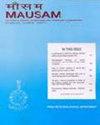海啸波的数值模拟以评估印度西海岸可能的影响
IF 0.7
4区 地球科学
Q4 METEOROLOGY & ATMOSPHERIC SCIENCES
引用次数: 0
摘要
利用TUNAMI N2代码对印度西海岸的海啸波进行了数值模拟。在本研究中,故障参数是从早期发表的文献中考虑的。从ETOPO2(全球地形模式)和GEBCO卫星数据中获得了测深数据和可能发生海啸的地点。在海啸上升过程中,使用了航天雷达地形任务(SRTM)的陆地地形数据。目前的模拟持续时间为6小时(360分钟)。估计了可能到达不同地点的振幅时间。本文还分析了在不同情景下,通过改变倾角和走向角,所产生的海啸波向印度西海岸方向的变化。讨论了古吉拉特邦沿海不同地区海啸波的时间序列和高度,以及海啸波的逐时行进图。在地震和最初的海啸波产生后,沿卡奇奇湾(古吉拉特邦)的所有地点在近2小时至5.30小时内到达,振幅从1米到2.5米,孟买在约4.45小时内到达,振幅为2米,果阿在约3.08小时到达,振幅为1米,卡尔瓦尔(卡纳塔克邦)在约3.12小时到达,芒格洛尔在约3.36小时到达,振幅各为1米。利用现有的报告和已发表的文献证实了1945年沿MSZ发生海啸地震的海啸阶段估计的真实性。本文章由计算机程序翻译,如有差异,请以英文原文为准。
Numerical Modelling of tsunami wave to assess the possible impacts along western coasts of India
Numerical modelling of tsunami waves has been made for the western coasts of India using TUNAMI N2 code. In this study the fault parameters are considered from earlier published literatures. Bathymetry data and possible tsunami generation locations have been obtained from the ETOPO2 (Global Relief Model) and General Bathymetric Chart of the Oceans (GEBCO) satellite data. For tsunami run-up the land topography data Shuttle Radar Topographic Mission (SRTM) is used. The present simulation consists of a duration of 6 hours (360 min). Possible arrival time with amplitude at various locations have been estimated. The paper also analyses the changes in the directivity of the generated tsunami waves towards western coasts of India by changing the dip and strike angles as different scenarios. Time series and height along the different parts of Gujarat coast and hourly travel-time chart of the tsunami wave are also discussed. After the earthquake and initial tsunami wave generation, it reaches at all the locations along the Gulf of Kachchh (Gujarat) in nearly 2 hrs to 5.30 hrs with amplitudes from 1 to 2.5 m, Mumbai in around 4.45 hrs with amplitude 2 m, Goa in around 3.08 hrs with amplitude 1 m, Karwar (Karnataka) in around 3.12 hrs and Mangalore in around 3.36 hrs with amplitudes 1 m each. The authenticity of the estimated tsunami phases of the 1945 tsunamigenic earthquake along the MSZ are corroborated with the available reports and published literatures.
求助全文
通过发布文献求助,成功后即可免费获取论文全文。
去求助
来源期刊

MAUSAM
地学-气象与大气科学
CiteScore
1.20
自引率
0.00%
发文量
1298
审稿时长
6-12 weeks
期刊介绍:
MAUSAM (Formerly Indian Journal of Meteorology, Hydrology & Geophysics), established in January 1950, is the quarterly research
journal brought out by the India Meteorological Department (IMD). MAUSAM is a medium for publication of original scientific
research work. MAUSAM is a premier scientific research journal published in this part of the world in the fields of Meteorology,
Hydrology & Geophysics. The four issues appear in January, April, July & October.
 求助内容:
求助内容: 应助结果提醒方式:
应助结果提醒方式:


